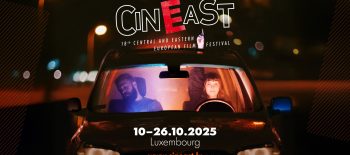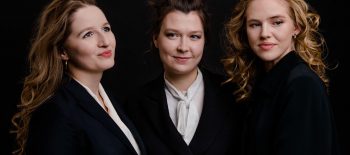Fantasiae, cantiones & choreae – Music of the sixteenth century Poland
The sixteenth century’s music with Polish connotations will be present at the 31 edition of the Brussels festival Midis Minimes (at the Royal Conservatory of Brussels) and at the Zomer van Sint-Pieter festival (in the Predikherenkerk church of Leuven).
This music, from the period that is traditionally considered to have been Poland’s “Golden Age”, is symptomatic of a vogue for “Polish songs“ and “Polish dances” which soon after was to spread across Europe, achieving what might have been the widest distribution of a fairly obvious, and yet hard to pinpoint musical “Polishness” before Chopin.
Traditions of keyboard and lute playing have been interrelated since the fifteenth century, with players often capable of performing on either. Despite producing distinctive sounds, the harpsichord and the lute – both plucked stringed instruments – blend quite naturally. To explore their combined sound, Corina MARTI and Michał GONDKO have derived their own “duo” versions from existing pieces of vocal and instrumental music. Intersperced between them are compositions intended for solo performance on each instrument.
+++ download the presentation text by Michał GONDKO (in our digital library)
+++ Practical information
PROGRAMME
- Anon. – Rex (from Jan z Lublina’s Livre d’orgue)
- Mikołaj z Krakowa [Nicolaus Cracoviensis], fl. 1st half of the XVI century? – Bona cor[ea?]
- Benedictus de Drusina, fl. 1556-1573 – Fantasia
- Mikołaj z Krakowa? – Ave ierarchia
- Anon. – Polnischer Tantz
- Mikołaj Gomółka, ca. 1535-ca. 1609 – Kleszczmy rękoma
- Mikołaj z Krakowa? – Praeambulum in G per B
- Mikołaj z Krakowa – Zaklolam szÿa Tharnem
- Albertus Ambrosius Długoraj, ca. 1557-ca. 1619 / Anon. – Chorea polonica / Cantio polonica
- Anon. – Jeszcze Marczynye (from Jan z Lublina’s Livre d’orgue)
- Mikołaj z Krakowa? – Haÿduczkÿ
- Wacław z Szamotuł, ca. 1524-ca. 1560 – Kryste dnyu nassey swyatlosci
- Anon. – Potorae Koniginn inn Polen Tantz (from the Emanuel Wurstisen Lute Book)
- Anon. – Fantasia primi toni (from the Gdańsk Manuscript)
- Christoph Löffelholz? – Ein gutter polnischer Tantz
Corina MARTI – Renaissance harpsichord
Michał GONDKO – Renaissance lute
PRACTICAL INFORMATION
Midis/Minimes festival
>>> Royal Conservatory of Brussels (Rue de la Régence 30A, 1000 Brussels) – see map
>>> Tuesday 11 July 2017 – 12:15
>>> €5 | free (-13)
Zomer van Sint-Pieter
>>> 30CC Cultural Center/Predikherenkerk chuch (Onze-Lieve-Vrouwstraat, 3000 Leuven) – see map
>>> Wednesday 12 July 2017 – 12:15
>>> €6 | free (-12)
Corina Marti’s performances recorders and harpsichord have been praised as “strikingly superior and expressive” (Toccata) and “infallible” (Diapason). Native from Switzerland, she graduated from the Lucerne Academy of Music, and later from the “Schola Cantorum Basiliensis”, where she now teaches early recorders and keyboard instruments. Her work has helped to bring about the present-day revival of these instruments.
Michał Gondko, in whose hands “phrases come across like extempore thoughts chasing each other across the imagination, an effect many try for but very few succeed” (Lute News, UK), studied classical guitar in his native Poland prior to focusing exclusively on historical plucked instruments of the lute family at the “Schola Cantorum Basiliensis”, where he studied with Hopkinson Smith. He is one of the leading lutenists of his generation.
Marti and Gondko are the driving force behind the ensemble LA MORRA« which, since its inception in 2000, has gained wide recognition for interpretations of late Medieval and early Renaissance repertoires that “never fail to keep the listener’s attention alive” (Gramophone). They have jointly led “La Morra” in numerous live appearances and recordings, inspiring enthusiastic response worldwide and earning such marks of musical distinction as the “Diapason d’Or”, the “Jahrespreis der deutschen Schallplattenkritik”, the American Musicological Society’s “Noah Greenberg Award” as well as “Gramophone” and “International Classical Music Award” nominations. In addition, Gondko is recipient of “Fryderyk”, a prize awarded by the Association of Polish Audio-Video Producers.
Besides CDs with La Morra, their discography features an acclaimed CD of early German music for keyboard and plucked stringed instruments (Von edler Art). Both Marti and Gondko appear regularly as recitalists on their respective instruments. Marti devoted her debut solo album (I dilettosi fiori) to the instrumental music of the fourteenth century and has recently been focusing on the sixteenth-century Italian and Polish keyboard repertoire. Polish contribution to the renaissance lute repertoire is the topic of Gondko’s debut solo album (Polonica). He has recently been exploring early seventeenth-century solo lute music from sources produced in the Baltic Sea area. Marti’s discography of Baroque music includes recorder concertos by Francesco Mancini and Alessandro Scarlatti, as well as chamber music by Charles Dieupart and Johann Sebastian Bach.
While primarily busy with their own early music projects, they still find time for musical collaborations and have shared the stage with such musicians as Dame Emma Kirkby and Jordi Savall, among others.
Concert tours have led them to the majority of European countries, as well as to the USA, Brasil, China, Japan and the countries of the Middle East.
Links
Midis-Minimes: http://www.midis-minimes.be/fr/
Zomer van Sint-Pieter: https://www.30cc.be/nl/zomer





